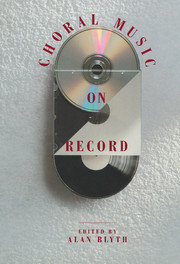Book contents
- Frontmatter
- Contents
- Preface
- Monteverdi: Vespers (1610)
- J.S. Bach: St John Passion
- J.S. Bach: St Matthew Passion
- J.S. Bach: Mass in B Minor
- Handel: Messiah
- Mozart: Requiem Mass
- Haydn: The Creation
- Haydn: The Seasons
- Beethoven: Missa Solemnis
- Mendelssohn: Elijah
- Rossini: Stabat mater Petite messe solennelle
- Berlioz: Grande Messe des Morts Te Deum L'Enfance du Christ
- Verdi: Requiem Mass
- Brahms: A German Requiem
- Fauré: Requiem
- Elgar: The Dream of Gerontius
- Walton: Belshazzar's Feast, Tippett: A Child of Our Time, Britten: War Requiem
- Stravinsky: The Wedding Symphony of Psalms
- Janáček: Glagolitic Mass
- Discographies
- Index
Mendelssohn: Elijah
Published online by Cambridge University Press: 02 December 2009
- Frontmatter
- Contents
- Preface
- Monteverdi: Vespers (1610)
- J.S. Bach: St John Passion
- J.S. Bach: St Matthew Passion
- J.S. Bach: Mass in B Minor
- Handel: Messiah
- Mozart: Requiem Mass
- Haydn: The Creation
- Haydn: The Seasons
- Beethoven: Missa Solemnis
- Mendelssohn: Elijah
- Rossini: Stabat mater Petite messe solennelle
- Berlioz: Grande Messe des Morts Te Deum L'Enfance du Christ
- Verdi: Requiem Mass
- Brahms: A German Requiem
- Fauré: Requiem
- Elgar: The Dream of Gerontius
- Walton: Belshazzar's Feast, Tippett: A Child of Our Time, Britten: War Requiem
- Stravinsky: The Wedding Symphony of Psalms
- Janáček: Glagolitic Mass
- Discographies
- Index
Summary
Elijah has been somewhat out of favour now for a number of years. The seemingly mild treatment of the biblical story has counted against it in an age which prefers something bolder than Mendelssohn's benign idiom. But, though the work may be overlong and some of its choruses excessively anodyne, it has a certain conviction and character all its own. Our problem may be that we are hearing a work written in 1844 through ears that have encountered all the Victoriana Mendelssohn engendered, but the kind of music he was composing was, at the time of its writing, comparatively new in idiom: Bach and Handel heard, as it were, through the light of mid-nineteenth-century harmony. However that may be, Elijah himself, in sure hands, emerges as a real, strong character, at once vehement, despairing and humane, and the rest of the solo writing is on the highest level of Mendelssohn's achievement. Besides, when the work is sung in the language (German) for which the notes were composed and with really purposeful and clean choral singing, as happens on the Sawallisch set, recorded in Leipzig with its genuine Mendelssohn tradition, his most favoured oratorio emerges as a picture newly cleaned, alive and immediate, not least because Sawallisch follows Mendelssohn in assigning the passages for concerted solo voices to these and not, as happens in most other recordings, to a boys' choir or to a reduced chorus.
The libretto is largely the work of the composer's theologian friend, Paul Schubring, who had helped him with St Paul.
- Type
- Chapter
- Information
- Choral Music on Record , pp. 151 - 163Publisher: Cambridge University PressPrint publication year: 1991

